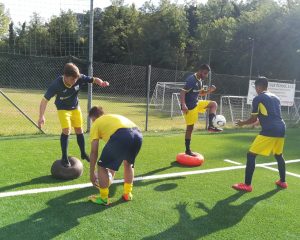Professional football is becoming more and more organised as time goes on, so if you want your child to become a football player you need to be aware of all the paperwork associated with the process.
One concept that revolves around the ‘professionalization’ of a footballer is his or her federative license.
This is a kind of enrollment that makes the player a member of his country’s Football Federation as a footballer, which allows him to compete in all kinds of regional, national and international tournaments.
Federating is a necessary requirement to become a football player in any club, at any age, in any country in the world; so it is a step you cannot and should not avoid.
Why is it necessary to federate as a football player?
Beyond the fact that it is an absolute requirement for all clubs and players worldwide, this licence is required by many football academies when it comes to accepting players.
 Football academies aim to develop the player’s skills and, at the same time, connect him with professional clubs where the player can continue his career.
Football academies aim to develop the player’s skills and, at the same time, connect him with professional clubs where the player can continue his career.
Thus, the Academies ask for players who have been federated by a club in order to confirm the quality and ability of the player before their registration.
It is also a way of levelling training and discriminating against applicants who may not have the required physical and technical level.
This is like a filter that is used in football camps to make sure that the level of all the football players is similar.
This is like a filter that is used in football camps to make sure that the level of all the football players is similar.
Being a federated player allows you to take advantage of all our plans and advice.
The great advantage of being a federated player is that it allows the academy a broad margin of negotiation and contacts with clubs.
Federated players are given the most comprehensive advice in the industry to guarantee that their football career gets off to a good start and stays that way until they make the professional breakthrough.
And, of course, the clubs also appreciate having a federated player because they can profit financially from any transfer involving him (due to FIFA’s training rights regulations).
What does it cost to federate a player in Spain and what are the requirements?
The first thing to do to federate a player is to contact a club licensed by the Royal Spanish Football Federation that has the competence to federate players acting as a sports institution.
 In addition, to this must also be added any additional costs that may be required to pay for the player’s compulsory insurance.
In addition, to this must also be added any additional costs that may be required to pay for the player’s compulsory insurance.
In general, this should not exceed 70-80 euros, although the amount varies depending on the club.
Once you have decided on the club that will act as intermediary with the RFEF, you only have to meet the requirements requested by the club.
Requirements:
Name, surname, and ID number. *
Date, place of birth and nationality. **
Names of father and mother.
Address of your home address.
Telephone number, e-mail, and other contact details.
*If the player is not at the age to have a national identity card, this field should be substituted with the national identity card of the parents or guardians.
** If the player is a foreigner, his federal license from his country of origin must be shown. Otherwise, the club will have to incur additional paperwork that may increase the administrative cost of the document, its issuing time and other consequences.
And depending on the age, the young footballers will be classified in one of these categories:
- PB for pre-benjamins from 6 to 8 years old.
- B for benjamins from 8 to 10 years old.
- A for juvenile (alevin) from 10 to 12 years old.
- I for infantile from 12 to 14 years old.
- C for cadets from 14 to 16 years old.
- J for youth (juvenil) from 16 to 18 years old.
Federating as a player is a necessity in all countries.
As we mentioned at the beginning of the blog post, the federation license is a requirement to start a career as a football player in all countries.
Therefore, here is the information on how to federate your child as a football player in France, England, Italy, Colombia, Mexico and the United States.
Federate as a football player in Mexico.
 Any football player who wants to become a professional in Mexico must find a club that will process his or her federation license with the FEMEXFUT.
Any football player who wants to become a professional in Mexico must find a club that will process his or her federation license with the FEMEXFUT.
The club will have to write a letter to the president of the Federation to request the player’s federative license or to consult his federative status, in the case of a foreigner.
The letter is sent with all the player’s personal details, the category in which he will play, the league in which he will be registered and the tournaments in which he is required to participate.
If the player is a foreigner and does not have Mexican nationality, the procedure should now be followed with the FIFA Players’ Status Committee, in which the club will act as mediator.
Federate as a football player in Colombia.
In Colombia, all players who want to debut in the professional categories of Colombian football must also be endorsed by a club.
 The Colombian Football Federation has licensed professional clubs all over the country to serve as endorsement for all these steps, so all you have to do is register your child with the Academy to get there.
The Colombian Football Federation has licensed professional clubs all over the country to serve as endorsement for all these steps, so all you have to do is register your child with the Academy to get there.
The club will contact the federation to start the paperwork for the player’s federative licence; so you will be asked for personal details of the child, his parents, contact numbers and more.
You can also take the option of hiring an intermediary or agent for the player, who will be in charge of bringing him or her to the most suitable club.
And yes, it is possible that with an agent it will be easier to get him accepted by a prominent club, but it should also be considered that this requires a lot more money than the normal procedure.
Federate as a football player in England.
 English football is renowned worldwide for the high level of organization of its youth teams and for being the breeding ground of some of the greatest players in the world.
English football is renowned worldwide for the high level of organization of its youth teams and for being the breeding ground of some of the greatest players in the world.
As in Spain, clubs are the only entities that have the power to intercede with the English Football Association to federate a player.
For this, the most effective way is to try to get your child into the Academy of a reputable club in the country, as they have greater facilities for the procedures.
The most direct way is to contact our football Academy in England, which provides consultancy services to take players to renowned clubs in England to continue their football development.
Federate as a football player in France.
 The French Ligue 1 is currently known as the league of talents, which has produced great stars of world football such as Kylian Mbappé, Aurelién Tchouaméni and Karim Benzema.
The French Ligue 1 is currently known as the league of talents, which has produced great stars of world football such as Kylian Mbappé, Aurelién Tchouaméni and Karim Benzema.
A good way to federate a player on French territory is to go to a football academy that offers facilities for the process.
As France is a country with a large footballing tradition and present, there are many players who try out for big clubs every year.
This is why enrolling your child in the academy prepares him for the high demands and makes his arrival at a big club easier.
A club that, later on, will be in charge of mediating with the French Football Federation for their federative registration with FIFA, as in other countries.
Federate as a football player in the United States.
 The United States is an excellent country to start out as a football player at any level, as the sport has grown dramatically in the last decade.
The United States is an excellent country to start out as a football player at any level, as the sport has grown dramatically in the last decade.
However, the procedure to federate in the North American country has its differences with respect to South America and Europe.
As in sports such as basketball and American Football, in the United States football (or soccer, as it is named there) has its own method.
Federate as a football player in Italy.
Among all the countries we have mentioned, Italy is the one that maintains the most classical structure regarding its youth teams.
 In Italy, the figure of the ‘neighborhood team‘ and the scout who is in charge of scouting promising players from different areas prevails.
In Italy, the figure of the ‘neighborhood team‘ and the scout who is in charge of scouting promising players from different areas prevails.
Nevertheless, the academies do not lose their effectiveness and can help you to get the procedure for federation as a football player more easily.
Of course, the competition for a place in a club will be tough, but like everything else in football, it depends a lot on the player’s perseverance and previous training.
As usual, the most important thing is to have the right tools and the necessary contacts at hand to ensure that the player’s career takes off and never has a limit.
Education is also important.
In it, players must go through a process that involves playing first in their school (High School) and university (College).
The player must pass his High School stage and take his first steps as an athlete in regional and national tournaments.
Afterwards, he must make it to a University that will allow him to participate in the NCAA, the men’s college football league.
The NCAA has three Divisions. The First Division is made up of universities that are fully focused on sports, with high-performing international and national students, most of whom are awarded scholarships for their great performance.
On the other hand, the Second Division offers a balance between sports and academics, while the Third Division is a league for those who are athletes and earned their scholarship solely based on their grades.
Those who don’t make it to the NCAA can opt for Junior College, a competition that takes those who couldn’t get a scholarship and helps them continue their education for two years.
After finishing your college career, it’s time for the Draft, in which MLS teams take part.
Major League Soccer clubs choose the most promising players in several rounds of the draft.
After their selection, the teams are responsible for professionalizing the players, federating them, and making them compete at the highest national level.
